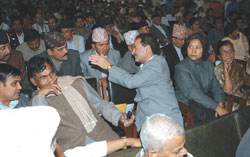|
|
The new interim government should have kept on some old hands for continuity. In particular, it's a shame Madhab Nepal did not see fit to retain the talented and thoughtful UML leader Pradip Gyawali. But then, what does Madhab Nepal know?
Knowledgeable sources say Gyawali's positive contributions to the peace process must not be overlooked. More than anyone else, it was he who toiled long hours to finalise the comprehensive peace agreement, the interim constitution, and the tripartite arms monitoring agreement. While Home Minister Krishna Sitaula and Maoist negotiator Krishna Bahadur Mahara got all the credit, it was Gyawali's patient prodding, pleading, and cajoling that delivered those agreements. His party may not acknowledge Gyawali's contributions, but let us hope that historians some day will.
Gyawali's talents will be missed in the coming days because the peace process is not yet over. There are many key negotiations ahead, most importantly on how to reform and democratise the Nepal Army and how to integrate the Maoist army with the nation's security sector. When those tough negotiations open, Gyawali will be sorely missed.
This brings us to a significant dynamic in the new cabinet: the retention of Sitaula as home minister. With the dissolution of the previous talks committees, Sitaula will from now on focus solely on improving security. A good thing, since giving him the dual responsibilities-strengthening security and negotiating with the very people wrecking it-was a bad idea to begin with.
But perhaps Sitaula should have been taken out of the Home Ministry and given Peace and Reconstruction instead. That way, he could have continued to be the point man of the seven-party alliance in talks with the Maoists, and someone else could have looked after security. This would have had the added advantage of keeping Sitaula in the government without seeming to be giving in to the demands of the Madhesi Janadhikar Forum. But Prime Minister Koirala can always be counted on to blow chances like this.
With Sitaula's wings clipped, the wily Ram Chandra Paudel has been thrust into centrestage as minister for peace and reconstruction. In this capacity, he is likely to lead all government negotiations with the Maoists as well as with madhesi, janajati, and other agitating groups. It's worth asking why a conservative hill bahun like Paudel-who not only dislikes the Maoists but has also shown no willingness to learn what fuels madhesi, janajati, and dalit anger-was put into this position.
Is his conservativeness a factor precisely because he won't be giving in as easily as Sitaula or Mahanta Thakur? Or is it the attraction of the reconstruction funds? Either way, Paudel's new position strengthens his hand in succeeding the ailing prime minister not just in government, but also in the Nepali Congress. It's a serious gesture to Sushil Koirala and Sher Bahadur Deuba.
Of the other appointments, one wonders why the UML sent Sahana Pradhan to lead its contingent. She is immensely intelligent and talented, but lacks influence in her own party. It would not be a good situation for the UML if the other coalition partners were to take her as a lightweight.
The Maoists' Mahara is in a similar position. Though regarded as influential within the party, no one is ever in doubt as to who really runs the Maoists. Not even a crow flies in Maoist territory without the Fierce One's permission.




